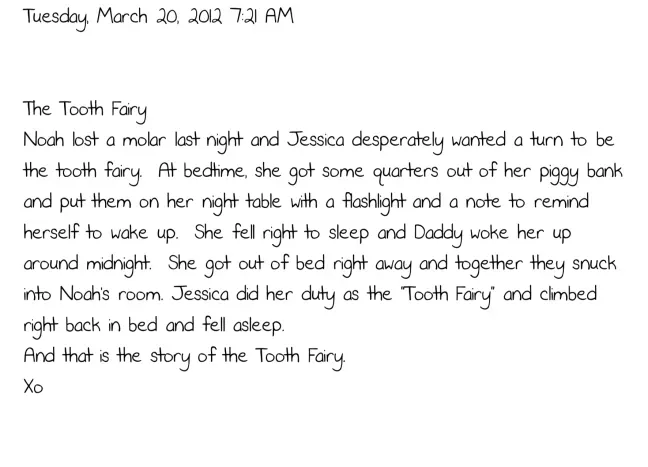What About The Tooth Fairy?

Q. I always tell the kids the truth 100% of the time, even when it comes to Santa, the Tooth Fairy and others. This gets me in trouble with family and friends who tell me to lie to them about it. When these conversations come up, I try to remove myself but if the kids ask me, I do not lie. What is your opinion on this?
A. This is a great question and lots of parents struggle with what and when to tell children about these characters. Sometimes this presents as a conflict between a mother and a father.
To be honest, the current state of chaos in the nation may be contributing to my answer today, vs. when my children were little. We may need the Tooth Fairy and Santa more than ever right now. Children deserve opportunities and experiences where they can smile and laugh with their whole self and to just be innocent children and escape the chaos and conflict. They deserve happy things to look forward to and to make special memories and traditions to pass down to their children.
It’s great that you are taking this seriously, being thoughtful about it and considering what is morally right, consistent with your parenting process and right for your family.
Most of us probably know 10 year olds who “still believe.” Some parents have 6 year olds who don’t believe, but feel it would disappoint their parents if they were to let on that they didn’t believe. Both scenarios are so sweet. Some children feel powerful when they tell other children the truth and send that child to a parent crying.
Ultimately, it’s the parent’s decision how they want to handle this. Here are some suggestions;
Emphasize the concept or theme that you think is important.
With Santa, if you have a belief about the holiday, you can surely put MOST of your emphasis on your faith and the practices and beliefs of your faith. You can talk about the legend of Saint Nicholas, his love and generosity and how he showed it. The legend doesn’t read that children wake up in the morning to an overflow of gifts for children to rip open. It’s about sisters who were poor and a generous man who put coins in their shoes while they slept. They woke up to this gift and were filled with gratefulness.
Playing Make-Believe and Lying Are Not The Same
Sure, most children are inevitably going to ask, “but is Santa real?” That’s when you can talk about it being a magical time of the year and that we can pretend about things, and when we pretend about beautiful, fun, loving things like this, it can bring a lot of joy and excitement. The joy and excitement is real and there is no harm in imagining magical things happening during special occasions. Think of it like going to Disney. All ages go there and know that Tinkerbell is a pretty lady who zips down on a wire, but for just a moment, we can believe that everything we are seeing is real. You may well have a problem with the whole Santa concept if your holidays are centered around material gifts. Children with whom the spirit of Christmas is lived out, not the spirit of Santa and the gifts he brings, will more successfully be able to move in and out of pretend more smoothly. But when we just flat out tell children, “Santa is not real” of course they want to kill the joy of all of their friends also. Instead of making it about what is not, make it about what it is.
Consider The Age
It’s just not necessary to make a declaration in the younger ages, but it’s also not necessary to build it up to such an extent that it’s all about Santa and the gifts. Those of us who had a young child who rushed off to bed and hid under the covers because the white bearded man might run into them in the hallway know that we have to be careful and know how our children think. There’s no need to go overboard with it. Young children are really good at imagining.
Talk It Over As Parents
I think Santa is the big one. You may feel differently about the Easter Bunny and Tooth Fairy. The important thing is for the parents to discuss these things and decide together how they will handle it. Listen to each other and accept that sometimes, someone has to bend.
Anecdotal From My Personal Experience
My husband and I handled Santa about as described above. Our son assumed the truth probably by the time he was 5 or 6. He was always more grown up than anyone expected he would be at any age. It seemed like we had an unspoken understanding with each other and I don’t remember ever having to directly address it. There didn’t seem to be a need to.
Our daughter was a bit more inquisitive, leading to a few conversations about it. As she got a bit older, she declared that she knew Santa wasn’t real. HOWEVER, every Christmas Eve she shifted into magical thinking mode and did the cookies, milk, note, get to bed, etc. as if it was all very real. This confused us for the first year or two but really, there was no need to address it. We just let it be. We love it that she can connect to that make-believe part of herself and think she probably takes after her Gramma in that regard, who is all about traditions and the spirit of the moment when it comes to holiday and other celebrations.
From my “Mommy Journal” (6 years old)

And, here is our tooth fairy story, which I absolutely love! Also from my “Mommy Journal!” (6 years old)





